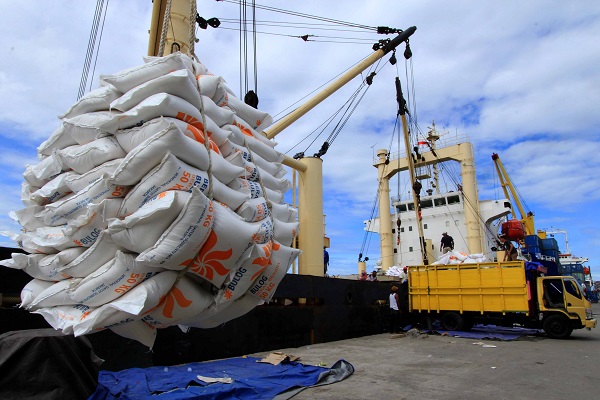
• As Nigeria-US trade hits $10bn yearly
Stakeholders have said manufacturers and exporters of locally-made goods to the United States must follow laid down procedures and rules, shun underhanded practices and seek guidance from experienced experts to stem rejection of goods and fully maximise the opportunities under the Africa Growth and Opportunity Act (AGOA).
Speaking at a one-day AGOA hybrid training workshop organised by USAID and Prosper Africa in partnership with the Nigerian Export Promotion Council (NEPC) and the Small and Medium Enterprises Development Agency of Nigeria (SMEDAN), founder and Chief Executive Officer (CEO), Agate Solutions LLC, Shaquana Teasley, said getting FDA approved is where many export businesses struggle.
“For instance, once an ingredient like citrus or any fruit extract is added to a product, even if you call it organic cream, the exporter has to get FDA approval. FDA approval (for food products and additives) is very different from USDA approval (for agricultural products) and you need a qualified liaison to help you navigate the system and not just anyone. This is part of the reasons goods are rejected because many exporters do not understand the intricacies of how to properly label and classify their goods, getting the right documentation and the right liaison to facilitate the process.
“If you are interested in doing business in the U.S., you will need certificates of origin, laboratory tests, record retention and an importer of record (IOR). The buyer of the goods should be your IOR to make it easier for you,” Teasley said.
Speaking on eligibility criteria for agricultural and processed food products as well as manufactured goods, she said to qualify, the products and goods in question must be grown, produced or manufactured in an AGOA-eligible country and products must also meet the specific criteria outlined in AGOA legislation. “Exporters must ensure products are classified correctly under the Harmonised System for accurate tariff assessments and duty-free eligibility under AGOA.”
“A practical example is that yams from Nigeria are often rejected and the main reason is that they aren’t processed well. Before putting them in reefer containers, they must be put in cold storage for one week at least. Most exporters don’t do this, which often leads to rejection of the items,” Teasley pointed out.
Deputy Assistant, United States Trade Representative for Africa, Osvaldo Gomez-Martinez, said as one of the largest economies in Africa, with a diverse and rapidly growing private sector, the country has the potential to significantly increase its exports to the U.S.
“While the oil sector has long dominated trade between both nations, the future lies in expanding beyond these sectors and embracing the full spectrum of AGOA-eligible products. Diversifying Nigeria’s export base away from crude oil, and by extension, expanding its sources of dollar inflows, is extremely important if Nigeria is to shield its economy from the volatility it currently suffers,” Gomez-Martinez stated.
Pointing out that the manufacturing and agricultural sectors represent the immense untapped potential Nigeria has to diversify its exports under AGOA, he said Nigerian producers and manufacturers have a unique opportunity to gain access to the U.S. market duty-free, giving their products a competitive edge. “However, realising this potential requires satisfying requirements such as compliance with U.S. regulations, meeting market standards and addressing logistical challenges.”
Adding that the government has a key role to play in ensuring businesses export under AGOA, he acknowledged the efforts of the NEPC and SMEDAN, who he said have been critical partners in supporting businesses to become export-ready. “We remain committed to supporting Nigeria’s economic growth towards increasing two-way trade, creating jobs and fostering greater prosperity for both nations. We must build sustainable, long-term trade relationships across various sectors, particularly those that have not traditionally been the focus of Nigeria-U.S. trade.”
Revealing that the U.S. government, through the Office of the United States Trade Representative (USTR) and the Federal Ministry of Industry, Trade, and Investment signed a Trade and Investment Framework Agreement in 2000 for the purpose of further developing bilateral trade, addressing trade barriers, and promoting economic cooperation, Gomez-Martinez said the AGOA workshop aligns with their goal to improve trade between both countries.
Representing the Executive Director, NEPC, Nonye Ayeni, the Regional Coordinator, South-West, NEPC, Ganiyu Ahmed Gbolagade, commended the workshop and said their goal is to ramp up export numbers as much as possible in the next year and with a dedicated AGOA desk and officer, are ready to guide and support businesses towards achieving this goal.
Consul General, U.S. Consulate Lagos, Will Stevens, said they decided to hold the workshop to assist Nigerian entrepreneurs and businesses in exporting under AGOA.
Describing the Act as a unilateral trade concession that the U.S. gives to roughly 45 African countries to export over 6, 800 different types of goods to the U.S. duty-free; he said he wants to see Nigeria diversify its exports under the programme. “Both countries have a good trade relationship, almost $10 billion yearly and $3.8 billion of this is under AGOA, but sadly falls under oil-related products. About 98 per cent of products that come into the U.S. under AGOA are oil exports. We want to see more businesses access the U.S. market because it accounts for 27 per cent of the global economy. So, when you access the U.S. market as a business, you are accessing a quarter of the global economy. Any business that can successfully sell in Nigeria can be successful in the U.S.”
Founder, Moore Organics and the president, Academy for Women Entrepreneurs Alumnae Association, Adebisi Odeleye, said it is important women are included in conversations regarding international and bilateral trade. She said they have understood how to document properly and understand AGOA’s requirements better, to benefit from it. She said the seminar presented an opportunity to help women entrepreneurs scale up and position their businesses for export.






